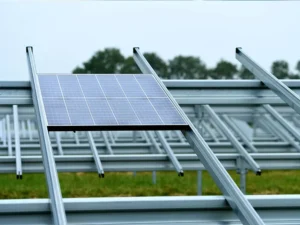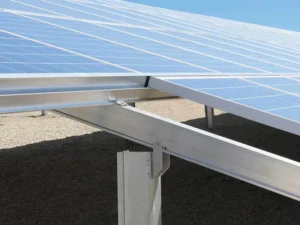Introduction:
Solar energy has become a mainstream source of renewable power. Today solar panels are a key component of harnessing this abundant energy resource. When it comes to constructing solar panels, the material of the frame is a crucial consideration.
Two popular choices are steel and aluminum solar panel frame. Both have their own set of advantages and disadvantages. In this article, we will delve into the pros and cons of using steel and aluminum for solar panel frames. It will help you understand which material may be better suited for your solar panel projects.
Steel Solar Panel Frames

Steel has been a traditional choice for structural applications due to its strength and durability. Here are the key features and considerations when using steel for solar panel frames:
Strength and Durability
One of the major advantages of steel is its superior strength. Steel can withstand significant loads and is highly durable. This makes it an ideal choice for solar panel frames that need to support the weight of the solar modules and endure various weather conditions.
Corrosion Resistance
Steel frames can be galvanized or coated to enhance their resistance to corrosion. Galvanization involves applying a protective zinc coating. It significantly prolongs the life of the steel frame, especially when exposed to outdoor elements. This is the reason why sometimes solar panel frame aluminum extrusions are used instead of normal solar panels.
Cost
Steel is generally more cost-effective than aluminum. It makes it an attractive option for solar panel frames. It can be a great option, especially for large-scale solar installations. The initial cost savings can be significant when using steel frames.
Weight
Steel frame is denser and heavier than aluminum solar frame. While this can be an advantage in providing stability, it can also be a drawback. For example, in cases such as rooftop installations where minimizing weight is important to prevent structural stress, it can be a drawback.
Environmental Impact
The production of steel typically involves more energy. It also emits more greenhouse gases compared to aluminum production. However, steel is highly recyclable, making it an eco-friendly choice. It is a good option from a sustainability perspective. Recycled steel can be used to manufacture solar panel frames. It reduces the demand for new raw materials.
Aluminum Solar Panel Frames

Aluminum has gained popularity in various industries due to its lightweight. It also has great corrosion resistance properties. Here are the key features and considerations:
Lightweight
Aluminum solar panel frame is significantly lighter than steel. This makes it a preferred choice for solar panel installations where reducing weight is essential. This characteristic is particularly advantageous for rooftop installations. It is also good for applications where the overall weight of the solar system needs to be minimized.
Corrosion Resistance
Aluminum naturally forms a protective oxide layer on its surface, making it an aluminum extrusion solar panel frame. This provides excellent resistance to corrosion. The layer also makes it suitable for outdoor applications. It can withstand exposure to moisture and other environmental factors without deteriorating.
Strength
While aluminum solar panel frame is not as strong as steel, it has enough strength to support solar modules. It can withstand normal environmental stresses. Design enhancements and structural considerations can compensate for it.
Cost
Solar aluminum frame is generally more expensive than steel. The higher cost is primarily attributed to the energy-intensive extraction. The refining process of aluminum ore (bauxite) is also expensive. But, its advantages like weight and corrosion resistance may outweigh the initial cost difference. But this is the reason for solar panel aluminum frame kit being expensive upfront.
Recycling
Aluminum frame for solar panel is highly recyclable and retains its properties even after recycling. Recycling aluminum requires significantly less energy compared to producing it from raw materials. Therefore, using recycled aluminum for solar panel frames can contribute to sustainability efforts. It can also reduce the environmental impact of the solar industry.
FAQs: Steel Or Aluminum Solar Panel Frame? Which Is Better?
1. What are the key advantages of using steel for solar panel frames?
Steel offers superior strength and durability. This makes it ideal for supporting the weight of solar modules. It can also endure various weather conditions. It is also cost-effective, providing initial cost savings for solar installations. Additionally, steel can be galvanized for enhanced corrosion resistance.
2. How does steel compare to aluminum in terms of corrosion resistance?
Steel frames can be galvanized or coated to improve their resistance to corrosion. Galvanization involves applying a protective zinc coating. It prolongs the life of the steel frame when exposed to outdoor elements. However, aluminum solar panel frame has a natural oxide layer that provides inherent corrosion resistance.
3. What advantages does aluminum offer for solar panel frames?
Aluminum is lightweight, making it suitable for installations where minimizing weight is essential. For example, rooftop installations. It has good corrosion resistance and is suitable for outdoor applications. While it may have a higher upfront cost than steel, its lightweight properties can lead to cost savings. You can save on transportation and installation costs.
4. Is aluminum as strong as steel for solar panel frames?
Aluminum is not as strong as steel, but it possesses sufficient strength. Aluminum frames for solar panels can support solar modules and endure normal environmental stresses. Structural design considerations can compensate for its lower strength.
5. Which material is more environmentally friendly, steel, or aluminum?
Both steel and aluminum have their environmental considerations. Steel production involves more energy and greenhouse gas emissions. However, steel is highly recyclable, reducing the demand for new raw materials. Aluminum is also recyclable and requires less energy for recycling.
6. Can recycled materials be used for both steel and aluminum solar panel frames?
Yes, both steel and aluminum can be manufactured using recycled materials. Recycled steel and aluminum are commonly used to create solar panel frames. They reduce the need for virgin materials. They also contribute to sustainability efforts in the solar industry.
7. Which material is more cost-effective in the long run for solar panel frames?
The cost-effectiveness of steel versus aluminum depends on various factors. They include the scale of the project and the specific requirements. Steel is generally more cost-effective upfront. Aluminum’s lightweight properties can lead to cost savings in the long run.
Conclusion:
The choice between steel and aluminum frame solar panel depends on various factors. Some include project requirements, budget, and environmental considerations. Steel offers superior strength, durability, and cost-effectiveness. This makes it a popular choice for many solar installations, especially large-scale projects. Its corrosion resistance can be enhanced through galvanization.
On the other hand, aluminum provides a lightweight, corrosion-resistant alternative. This makes it ideal for applications where weight is a critical factor, such as rooftop installations.
In summary, both steel and aluminum frame solar panel have their unique advantages. The decision depends on the specific needs of the solar project. Assessing the project requirements and consulting with solar industry professionals are important. They can help maximize the efficiency and longevity of the solar panel system. Balancing strength, weight, cost, and sustainability considerations are important. They will ensure the solar panel frame material aligns with the goals of the solar project.
